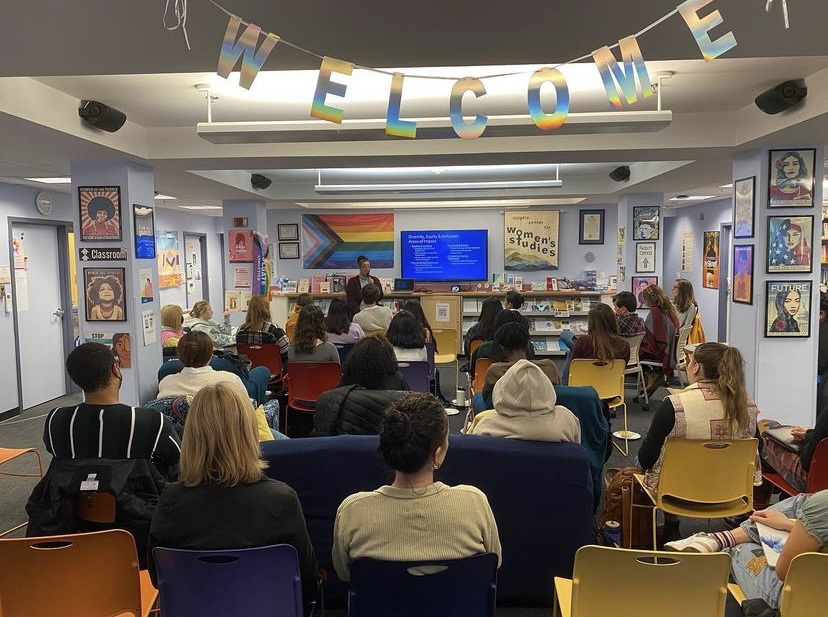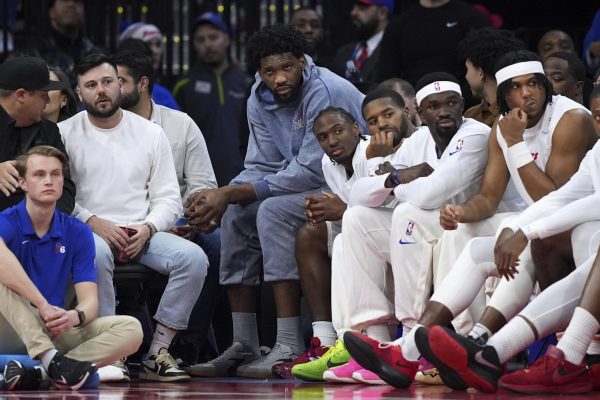WMST Interns: Centering Inclusion
Senior Graci Galvez, a women’s studies (WMST) and molecular biology concentrator, has served as an intern in the Center for Women’s Studies since the fall of her junior year. Exposed to both a women’s history course and Introduction to Women’s Studies with Professor Meika Lowe (referred to as the “rite of passage” course by many within the department) early in her Colgate career, Galvez said she was hooked on pursuing women’s studies further.
Galvez’s decision to become an intern and further incorporate herself into the WMST department stemmed from her love of brown bag talks hosted by WMST and the sense of security she found in the Center.
“[The Center] is probably the most warm, cozy and safe environment on campus. It houses both WMST and LGBTQ studies. I just really loved it and I loved how safe it felt,” Galvez said. “I loved how [the other interns] made it feel. And I wanted to be part of that, especially in a place like Colgate where there aren’t many safe spaces. So I wanted to be part of cultivating a safe space for Colgate students.”
Sophomore Emilia Bennett, the social media intern for the Center, also spoke highly of the warm environment existing within the walls of the East Hall basement, where the Center is located.
“I think the first time I ever went to the WMST Center I was with my [rowing] teammate [and fellow intern, Noha Shahba], and everyone was sitting around in the beanbags just chatting and studying,” Bennett shared. “Everyone seemed so happy, and it was such a welcoming atmosphere right from the start.”
Galvez now devotes about five hours of her time each week to the Center. These are spent meeting individually with Amelia Bunce, the Center’s coordinator, participating in Intergroup Dialogue sessions with the other interns and helping with the newsletter. Her working hours work towards a goal established by the six interns and Bunce.
“Most of our goals for the semester are to make the center a space where it’s student-focused, safety-focused — just making it a welcoming space for everybody,” Galvez said.
Bunce said she was drawn in by both of these same goals and her prior academic research.
“I was initially interested in the Center from an academic perspective. I studied history in graduate school and focused on domestic life, spousal violence and women’s health,” Bunce said. “I had just left an academic advising position, so I found the Center to be a great nexus between my scholarly interests and continuing to work with students.”
While working with the Center’s student interns is a significant part of her role, Bunce partakes in a lot of behind-the-scenes work.
“I conceptualize the content of our brown bags, find speakers, supervise our interns and help them realize their own projects. I work with student organizations, other centers, programs, and resources around campus to build our community,” Bunce said.
Brown bag lunches hosted by the department not only serve as an opportunity for the wider community to connect, but also a chance for the six interns to show up for one another and represent WMST to their best ability. Every Tuesday afternoon, the interns are charged with ensuring these brown bags run smoothly, whether that be introducing the speaker, mitigating discussion or making sure the catering is in place.
Galvez, who is particularly interested in topics of sexual health and sexualities, feels her most important contribution to the Center was running Colgate’s first-ever sex toy bingo event, which took place last spring.
“Not many tears, but a lot of sweat [in planning],” Galvez admitted. “it was one of those things where, like, I couldn’t believe that I had done it all on my own. I think that was the first time probably ever where we hit the capacity of people that can enter the Center — people were packed in there like sardines.”
Galvez actively tries to maintain WMST as a place of vulnerability and openness. Her first interactions with the Center laid the foundation for this vision.
“What I remember distinctly [during a brown bag] was kind of this call and response thing that [a past Center coordinator] did in the beginning where she walked down the aisle of everybody that was sitting there and asked us all how we were doing, and then it was kind of this beautiful call and response thing,” Galvez said.
Sensing the openness that the Center fostered then seemed to directly translate to Galvez’s decision to start sex toy bingo.
“It was centered on desire. A lot of people don’t want to talk about that. As it was happening, I could tell that people were kind of uncomfortable, like, they didn’t want to come up and get their toy. It was just like no like we’re all here for one thing and that’s because there are certain things and extra bodies that make our bodies feel good. And we owe it to ourselves to feel it. […] It’s about bringing people together in a space where they can get vulnerable.”
The WMST Center interns hold a coveted position on this campus. Bunce considers working with them a highlight of her role.
“The most gratifying aspect of my job is working with our wonderful interns. They are such thoughtful and passionate young people. I aim to create an environment in our center that reflects them and the communal dialogues they’d like to open,” she said.
For anyone looking to get involved with the WMST Center and continue the legacy of inclusion, Galvez recommends just going for it:
“If you have a really deep passion for women’s studies, gender studies, inciting change or just keeping a safe space for people on campus, by all means, do it… the Center welcomes anyone.”










